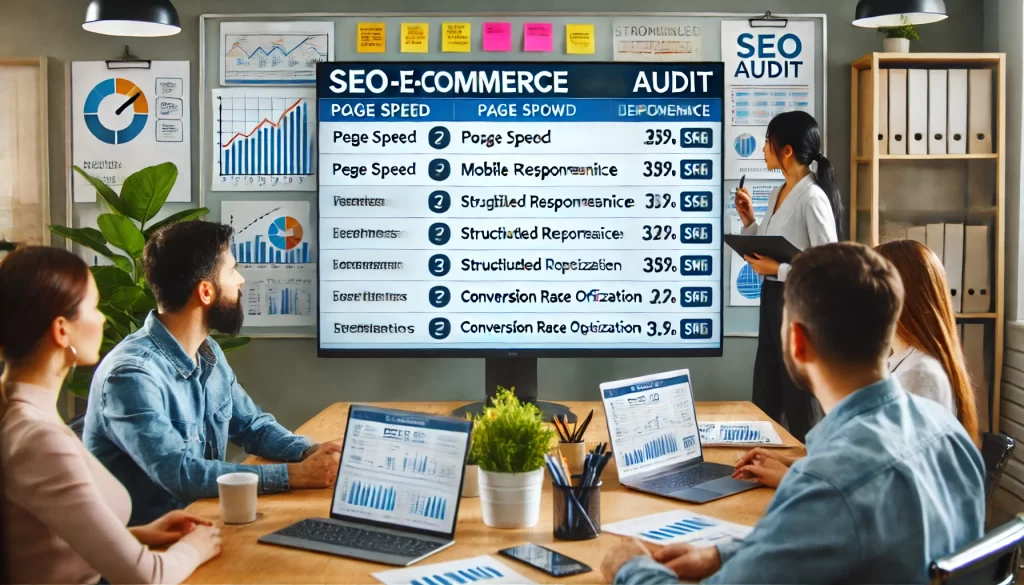SEO for e-commerce websites is different from blogs or service-based websites. Online stores have hundreds (or thousands) of product pages, dynamic content, and complicated site structures that impact rankings.
✔ Better rankings mean higher sales & conversions
✔ A well-structured store improves user experience & navigation
✔ Fixing technical issues prevents traffic & revenue loss
If your e-commerce store isn’t ranking well or you’re losing organic traffic, an SEO audit will identify & fix the issues.
Suggested Posts:
• Trends in Real Estate Websites
• Real Estate Listings and Search Engines
• Marketing and SEO for Real Estate Websites

Step-by-Step Guide to Performing an E-Commerce SEO Audit
Step 1: Crawl Your Website for SEO Errors
🔹 Use Screaming Frog, Ahrefs, or SEMrush to scan for errors
🔹 Identify broken links, duplicate content & missing metadata
🔹 Fix 404 errors, redirect loops & orphan pages
✅ Fix: Ensure your website is fully crawlable & error-free
Step 2: Optimize Site Structure & Navigation
🔹 Keep URLs short, clean & keyword-friendly (e.g., example.com/shoes/nike-air-max)
🔹 Use breadcrumb navigation to help users & search engines navigate categories
🔹 Improve internal linking to key product & category pages
✅ Fix: Make navigation user-friendly & SEO-optimized
Step 3: Improve Page Speed & Mobile-Friendliness
🔹 Use Google PageSpeed Insights to analyze performance
🔹 Optimize images, enable lazy loading & use a CDN
🔹 Ensure mobile users can browse & purchase easily
✅ Fix: Improve load speed & mobile UX for higher conversions
Step 4: Fix Duplicate Content & Canonical Issues
🔹 Identify duplicate product pages caused by filters, sorting & pagination
🔹 Use canonical tags to prevent duplicate content issues
🔹 Merge similar product pages to avoid keyword cannibalization
✅ Fix: Implement proper canonical tags & eliminate duplicate pages
Step 5: Optimize Product Pages for SEO
🔹 Write unique, keyword-rich product descriptions (avoid manufacturer copy-paste!)
🔹 Optimize title tags, meta descriptions & product images
🔹 Add user reviews, FAQs & schema markup for better rankings
✅ Fix: Make product pages SEO-friendly & informative
Step 6: Improve Category Pages for SEO
🔹 Add optimized content (intro paragraphs, FAQs) to category pages
🔹 Use proper H1, H2, and internal links for structure
🔹 Optimize meta descriptions & URLs for better visibility
✅ Fix: Treat category pages as ranking pages, not just navigation pages
Step 7: Audit & Optimize Your Backlinks
🔹 Use Ahrefs or Moz to check your store’s backlink profile
🔹 Remove toxic or spammy backlinks (disavow if necessary)
🔹 Build high-authority links via guest posts & digital PR
✅ Fix: Improve domain authority with high-quality backlinks
Suggested Posts:
• Ecommerce Schema Markup
• Optimize Ecommerce Website for Mobile Shoppers
• Types of Real Estate Websites

Common E-Commerce SEO Issues & How to Fix Them
| SEO Issue | How It Affects Your Store | How to Fix It |
| Slow page speed | High bounce rate, lower sales | Optimize images, enable caching, use a CDN |
| Duplicate content | Low rankings & cannibalization | Use canonical tags & merge similar pages |
| Poor category page SEO | Missed keyword opportunities | Add optimized content & proper metadata |
| Broken links & errors | Poor user experience & lost sales | Fix 404 errors & implement proper redirects |
| Weak product descriptions | Low rankings & engagement | Write unique, keyword-optimized content |
💡 Tip: Regular SEO audits prevent these issues before they impact revenue.
Best SEO Tools for E-Commerce Website Audits
✅ Google Search Console → Checks indexing & technical SEO
✅ Google PageSpeed Insights → Site speed & Core Web Vitals
✅ Screaming Frog / Sitebulb → Crawls large e-commerce stores for SEO issues
✅ Ahrefs / Moz / SEMrush → Backlink profile & competitor analysis
FAQs About E-Commerce SEO Audits
How often should e-commerce websites have an SEO audit?
Every 3-6 months or immediately after ranking drops.
What’s the most important part of an e-commerce SEO audit?
Site structure, product page optimization & duplicate content fixes.
Can SEO audits increase online store sales?
Yes! Fixing SEO issues improves rankings, traffic & conversions.
Key Takeaways
E-Commerce SEO Audits
✔ Regular SEO audits improve rankings, site structure & conversions
✔ Technical issues like duplicate content & site speed must be fixed ASAP
✔ Product & category pages need keyword optimization & structured data
✔ Backlinks & internal linking strategies boost domain authority
If you want higher rankings & more e-commerce sales, start with an SEO audit today!
Next Step?
Need a professional SEO audit for your e-commerce store?📩 Request a Free SEO Audit
